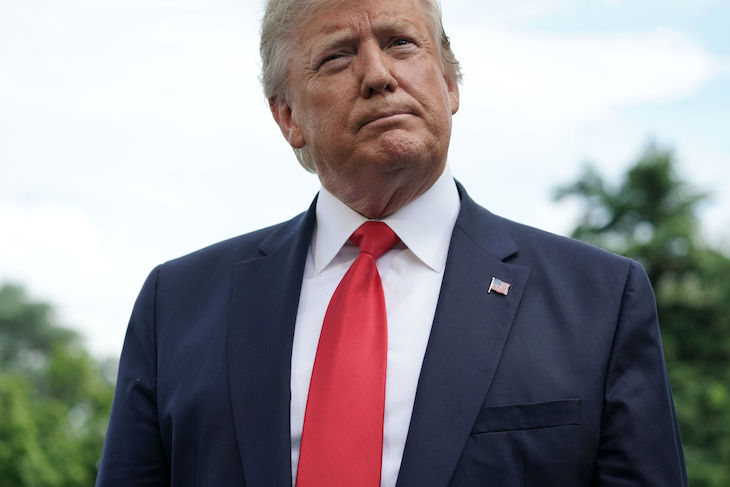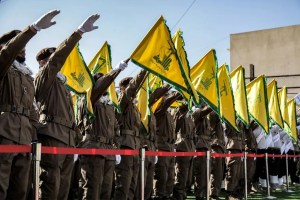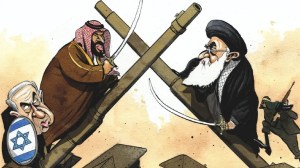If truth is the first casualty of war, the second casualty of war is credibility. Last week, much of the American media chose not to believe Mike Pompeo when he presented a Central Command video which, he said, showed an Iranian crew tinkering with limpet mines and an oil tanker.
‘Tankers Are Attacked in the Mideast, and US Says Video Shows Iran Was Involved,’ was the New York Times’s headline. An op-ed in the same issue pondered whether the administration’s ‘narrative’ of the tanker attacks was a Gulf of Tonkin-style fake.
Today, the Times is certain of its facts: ‘Trump Approves Strikes on Iran, but Then Abruptly Pulls Back.’ It has the ring of truth, which is always dangerous whether it is true or not. And we incline to believe it not so much because it reflects the hair-trigger nature of US-Iran tensions, or because the story is well-sourced — our DC editor, Curt Mills, heard the story on Tuesday night from three different sources — but because it seems to reflect one of the few commonly held ‘narratives’ in modern American life: the psychology of Donald Trump.
Trump is not a warmonger. He is a monger of the commodities whose value rises in times of peace and stability: golf courses, luxury apartments, university degrees, reality TV. He is, as he ceaselessly reminds us, the winner in the race of life. He received the presidency as a kind of gold watch, confirming decades of selfless service to himself.
Trump is, though, a patriot. His patriotism is part of his bottom-line realism: if you’ve invested in America, of course you should love it and seek to protect your investment. So far, this has served him and the American people better than the wisdom of the policy experts served all the other post-Cold War presidencies.
Looking back, every president since 1990 made serious errors in war. George H.W. Bush chose not to finish the job in Iraq. Bill Clinton antagonized Russia and China by bombing Serbia. Most disastrously, George W. Bush chose to finish the job in Iraq, and start a war in Afghanistan. Barack Obama casually destroyed Libya.
It is to Trump’s enormous credit that, though every problem looks like a nut to a man with a hammer, he has so far avoided using American military power as a substitute for thought and policy. It is now Trump’s dilemma that the nuts who run Iran are daring him to drop the hammer. As usual, this dilemma has arisen in part because of Trump’s own actions.
It was typical of Trump’s practical realism that he dismissed the JCPOA as a bad deal. It was typical of his hubris that he believed that he could convince the Iranian regime to accept a deal that was better for the United States, and hence worse for the Iranian regime — not by inducement but by ‘maximum pressure’ alone, by blustering and sending out the fleet, by walking loudly with a big stick, and leaving the carrot at home.
Trump has a realistic grasp of how most people will react to a high-pressure sales pitch, even though experience teaches that the seller cannot deliver on his most extravagant promises. On Tuesday, Trump launched his pitch to retain the White House in 2020. To preserve the pitch, he cannot let reality intrude too far in to his promises. He must, in other words, sustain the profitable illusions of peace.
The Iranian regime are not most people: they are pursuing their own high-pressure sales pitch for hegemony in the Middle East. At the UN, Iran’s ambassador Majid Takht Ravanchi has called the American use of a drone a ‘blatant violation of international law’, a ‘provocative act’ against the ‘territorial integrity’ of another member state. The Iranian regime is familiar with this chapter of international law. The reality is that a rich variety of Iranian drones, proxy militias and soldiery have violated the territorial integrity of Lebanon, Syria, Iraq, Yemen and Israel, as part of Iran’s campaign to rule the Middle East.
Iran’s long game has repeatedly acted as a reality check on the United States, from Beirut in the early Eighties to Iraq and Syria. Trump seems to grasp that war’s realities are incontrovertible. Iranian retaliation, and the killing of American servicemen and women, cannot be smoothed over as a problem of optics. A president who won in 2016 by denouncing the imperial follies of previous presidencies could only risk a war that he knew he could win.
In 2013, when the Assad regime crossed Obama’s ‘red line’ by using chemical weapons, Barack Obama called off airstrikes against Syria at the last minute, apparently because he lacked European support. Obama’s sales pitch was the institutional realism of alliances and that chimera, the ‘international community’. He didn’t proceed because he recognized that reality would not support his ideals.
This week, if we can believe what the papers are saying, Trump didn’t proceed with strikes on Iran for similar reasons. The realty of war destroys civilian illusions as well as military lives. Trump has prospered, and the US economy has prospered under his presidency, from the recognition that people, as T.S. Eliot said, ‘cannot bear very much reality’, and would prefer to buy a dream instead.
Obama has said that the decision not to bomb Syria took ‘political courage’. He is right to say that. It was presidential of Trump to resist pressure from his advisors to drop the hammer on Iran. Was it political courage, or sensible fear? And who has the better grasp of reality, the recklessly courageous or the sensibly fearful?
Dominic Green is Life & Arts Editor of Spectator USA.


















